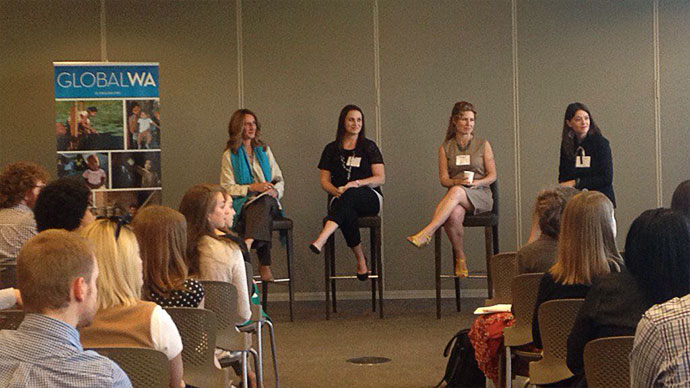By Annelise Matsuo, Membership & Events Intern, Global Washington

On July 20, 2016, Global Washington partnered with Landesa to lead a panel discussion on careers in international development, hosted at the PATH headquarters in Seattle. The discussion was moderated by Global Washington’s Executive Director, Kristen Dailey, and included Radha Friedman, Michele Frix, and Rebecca Okelo, three young professionals who have already made significant contributions to the vibrant international development community in Washington state. Friedman currently serves as Director of Programs at World Justice Project, Michele Frix is Chief of Staff at the Seattle Foundation, and Rebecca Okelo is founder and Executive Director of MED25 International.
While the panelists have all experienced career success, each have been on a unique journey to get where they are today. Okelo grew up with a passion for international issues and founded MED25 at the age of 21 when she saw a need for increased quality and funding of healthcare in Africa. Friedman was inspired by her experiences as a child living in South Asia where she witnessed firsthand social injustice and gender inequality. Frix embraced her studies in international issues and human rights, and then found her passion while in Central America working with a small women’s rights organization. We often hear the metaphor “climbing the ladder” to describe the path to career success. But career paths in international development can more accurately be described as navigating a jungle gym, with no established or required trajectory.
The panelists addressed many of the questions that students and young professionals often find themselves asking, such as the debate over getting out-of-country experience versus spending time developing skills in a U.S. office. While working abroad isn’t for everyone, and it is possible to have a career in international development without spending significant time overseas, one can gain much insight by spending time working on the ground in developing regions. The panelists noted that it is often much easier to go abroad as a younger person, as opposed to being further in a career and having more personal and professional responsibilities. One mistake that NGOs and foundations sometimes make is simply telling a community what their issues are and how to fix them without actually understanding the community’s needs and barriers to success. Because solutions are not one-size-fits-all, it is valuable to have a diverse team where staff truly understands the context of issues on the ground.
The panel also discussed how to adapt and grow as part of an organization when you might not have an expertise in the variety of roles that must be filled. In the case of many grassroots organizations and small NGOs, it is often necessary for staff to fill roles such as communications, fundraising, financing and development. Being flexible and learning how to shapeshift to what an organization needs can be a very valuable quality. Conquering the role of a generalist can also be beneficial as the organization grows and is able to take on a larger staff with more specific expertise. Having a hand in every facet of an organization often helps you retain a bigger picture perspective, allowing you to constantly think about how the organization can further expand and improve.
Education and advanced degrees also have advantages, and can contribute to a person establishing their leadership style and gaining respect from colleagues and the community. As a 21-year-old executive director, Okelo found that she was not always taken seriously by government officials, business leaders and potential donors. By earning her MBA, she secured the strong background that donors and partners were often looking for in a leader, which in turn made Okelo a more effective leader of MED25 International.
Panelists emphasized the importance of being yourself and having confidence in your abilities and ideas. Millennials often work in creative ways, and the panel encouraged attendees to speak up and believe in their ability to change the world. A recurring theme of the day was that young professionals shouldn’t focus too much on how to get to C before reaching A and B. You never know what your small steps will lead to, and you should remember to celebrate small victories and enjoy making connections along the way. Professors and/or mentors will often share opportunities that have the potential to further your career in ways you hadn’t imagined. With an openness and willingness to explore these opportunities and always continue learning, career success and innovation in international development can happen when you least expect it.